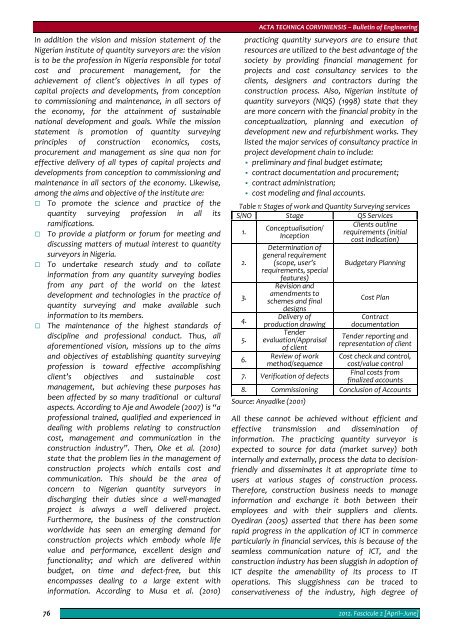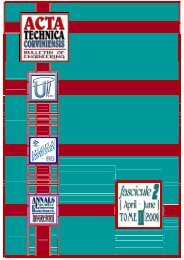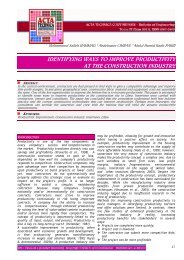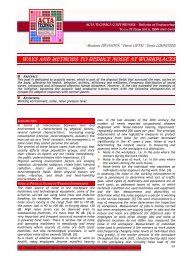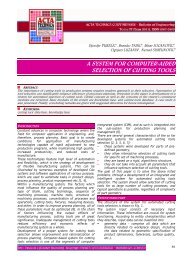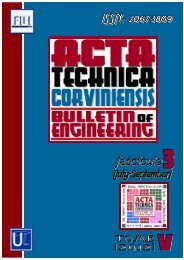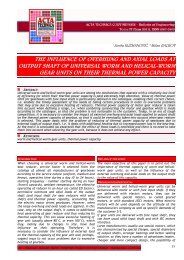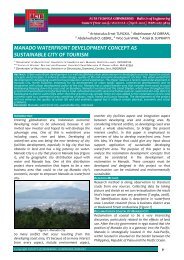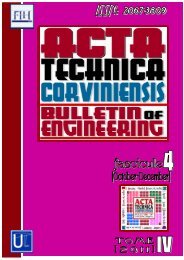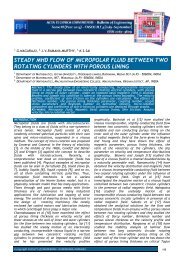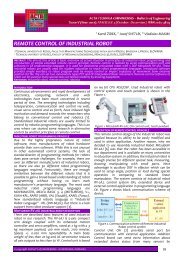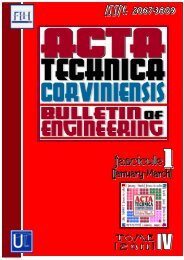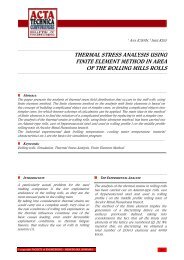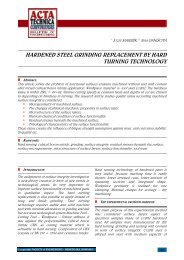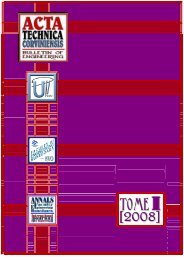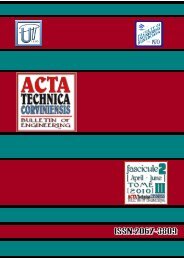Editorial & Advisory Board - Acta Technica Corviniensis
Editorial & Advisory Board - Acta Technica Corviniensis
Editorial & Advisory Board - Acta Technica Corviniensis
You also want an ePaper? Increase the reach of your titles
YUMPU automatically turns print PDFs into web optimized ePapers that Google loves.
In addition the vision and mission statement of the<br />
Nigerian institute of quantity surveyors are: the vision<br />
is to be the profession in Nigeria responsible for total<br />
cost and procurement management, for the<br />
achievement of client’s objectives in all types of<br />
capital projects and developments, from conception<br />
to commissioning and maintenance, in all sectors of<br />
the economy, for the attainment of sustainable<br />
national development and goals. While the mission<br />
statement is promotion of quantity surveying<br />
principles of construction economics, costs,<br />
procurement and management as sine qua non for<br />
effective delivery of all types of capital projects and<br />
developments from conception to commissioning and<br />
maintenance in all sectors of the economy. Likewise,<br />
among the aims and objective of the institute are:<br />
To promote the science and practice of the<br />
quantity surveying profession in all its<br />
ramifications.<br />
To provide a platform or forum for meeting and<br />
discussing matters of mutual interest to quantity<br />
surveyors in Nigeria.<br />
To undertake research study and to collate<br />
information from any quantity surveying bodies<br />
from any part of the world on the latest<br />
development and technologies in the practice of<br />
quantity surveying and make available such<br />
information to its members.<br />
The maintenance of the highest standards of<br />
discipline and professional conduct. Thus, all<br />
aforementioned vision, missions up to the aims<br />
and objectives of establishing quantity surveying<br />
profession is toward effective accomplishing<br />
client’s objectives and sustainable cost<br />
management, but achieving these purposes has<br />
been affected by so many traditional or cultural<br />
aspects. According to Aje and Awodele (2007) is “a<br />
professional trained, qualified and experienced in<br />
dealing with problems relating to construction<br />
cost, management and communication in the<br />
construction industry”. Then, Oke et al. (2010)<br />
state that the problem lies in the management of<br />
construction projects which entails cost and<br />
communication. This should be the area of<br />
concern to Nigerian quantity surveyors in<br />
discharging their duties since a well‐managed<br />
project is always a well delivered project.<br />
Furthermore, the business of the construction<br />
worldwide has seen an emerging demand for<br />
construction projects which embody whole life<br />
value and performance, excellent design and<br />
functionality; and which are delivered within<br />
budget, on time and defect‐free, but this<br />
encompasses dealing to a large extent with<br />
information. According to Musa et al. (2010)<br />
76<br />
ACTA TECHNICA CORVINIENSIS – Bulletin of Engineering<br />
practicing quantity surveyors are to ensure that<br />
resources are utilized to the best advantage of the<br />
society by providing financial management for<br />
projects and cost consultancy services to the<br />
clients, designers and contractors during the<br />
construction process. Also, Nigerian institute of<br />
quantity surveyors (NIQS) (1998) state that they<br />
are more concern with the financial probity in the<br />
conceptualization, planning and execution of<br />
development new and refurbishment works. They<br />
listed the major services of consultancy practice in<br />
project development chain to include:<br />
• preliminary and final budget estimate;<br />
• contract documentation and procurement;<br />
• contract administration;<br />
• cost modeling and final accounts.<br />
Table 1: Stages of work and Quantity Surveying services<br />
S/NO Stage QS Services<br />
1.<br />
Conceptualisation/<br />
Clients outline<br />
Inception<br />
requirements (initial<br />
cost indication)<br />
2.<br />
Determination of<br />
general requirement<br />
(scope, user’s Budgetary Planning<br />
requirements, special<br />
features)<br />
3.<br />
Revision and<br />
amendments to<br />
schemes and final<br />
designs<br />
Cost Plan<br />
4.<br />
5.<br />
Delivery of<br />
production drawing<br />
Tender<br />
evaluation/Appraisal<br />
of client<br />
Contract<br />
documentation<br />
Tender reporting and<br />
representation of client<br />
6.<br />
Review of work<br />
method/sequence<br />
Cost check and control,<br />
cost/value control<br />
7. Verification of defects<br />
Final costs from<br />
finalized accounts<br />
8. Commissioning Conclusion of Accounts<br />
Source: Anyadike (2001)<br />
All these cannot be achieved without efficient and<br />
effective transmission and dissemination of<br />
information. The practicing quantity surveyor is<br />
expected to source for data (market survey) both<br />
internally and externally, process the data to decisionfriendly<br />
and disseminates it at appropriate time to<br />
users at various stages of construction process.<br />
Therefore, construction business needs to manage<br />
information and exchange it both between their<br />
employees and with their suppliers and clients.<br />
Oyediran (2005) asserted that there has been some<br />
rapid progress in the application of ICT in commerce<br />
particularly in financial services, this is because of the<br />
seamless communication nature of ICT, and the<br />
construction industry has been sluggish in adoption of<br />
ICT despite the amenability of its process to IT<br />
operations. This sluggishness can be traced to<br />
conservativeness of the industry, high degree of<br />
2012. Fascicule 2 [April–June]


